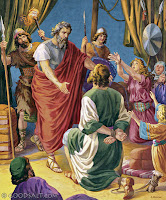After These Things: Believe, Hope and Endure
 |
| Abram refuses Bera's rewards and accepts blessings of Melchizadek |
We all have trials. It is not that we have them but rather how we choose to deal with them. Abram chose to believe not in the arm of man but rather in God, to hope not for riches but for the blessings of heaven, and to endure his time of challenge with a strength and fortitude that promised him sacred opportunity, wisdom, perspective and promise.
 |
| Ancient Irrigation Techniques |
I have had many trials in my life. I imagine that many of my trials have not been too different from what Abram endured. The scenes and props may change but personal trials tend to be the same. We know
from history that his time in history was one of where man attempted to gain
control over mother- nature and create a sense of stability in his life. As man gained a sense of understanding
over crops, water and weather, he still had to deal with himself. Through all of the innovations,
inventions and discoveries and after all of this time, I have to wonder how
much the true nature of man with relation to one another has changed? Has the
human condition improved? I believe Abram understood that the ability to truly
change the human condition began with a faith in a power greater than his own.
Abram’s story of faith began in Genesis 14. As I was
reading Genesis 15 my mind caught the words, “after these things.” What things?
I went back to Genesis 14 and discovered a few important things that Abram had
done. (because the chapter deals mostly with the wars between the 9 kings, it
is easy to miss Abram’s important role) These things were prerequisite to his
vision where “the word of the Lord came unto him.”
Before I delineate Abram’s role I want to set the stage.
There were 4 kings
that “made war” with 5
kings. The four kings I will call Team A (for Amraphel king of Shinar). The 5 kings I will call Team B for Bera
king of Sodom
Team A: Shinar, Ellasar, Elam and Nations (Geneses 1)
Team B: Sodom, Gomorrah, Admah, Zeboiim, Zoar (Geneses 2)
Who: Team A make
war with Team B in the vale of Siddim near the salt sea.
Why: They had
served Chedorlaomer (king of Elam) 12 years, but in the 13th year
they rebel.
What: 14th year Chedorlaomer comes with his 3 other kings and
plumaged and smote the REphaims, Zuzims, Emims, Horites, the Amalekites, and the
Amorites. In other words they were on rampage as a rebellion.
The five kings joined together to stop the slaughter.
(Genesis 14:9) They came together at the vale of Siddim where there were
slimepits. A slimepit is a plot of earth that is soft and mucky, usually of
clay or very moist mud. The point of this reference is to help us understand
that the kings of Sodom and Gomorrah could not take a stand because the ground
would not allow for it. It was a very precarious place to stand a fight against
the confederate forces. They fled.
The confederates come and take the spoils of war: all the
goods of Sodom and Gomorrah, all the food, and all the people for slaves. And a ally of Abram comes to
tell him of Lot’s capture.
What did Abram who dwelled in the plain of Mamre the
Amorite do:
- · He armed his trained servants (318 of them)
- · He pursued Chedorlaomer and his 4 kings to the land of Dan
- · He divides himself with his servants and attacks them at night and pursues them to Hobah
- · He slaughters Team A (all 4 kings) at the valley of Shaveh (the kings dale)
- · He then brings back all of the spoils that had been taken, “all the goods, his brother Lot, the women, and the people.” (Gen 14: 16)
- · He receives a blessing from Melchizedek
- · He pays his tithes
- · He gives credit to his “most high God”. (Genesis 14:22-24)
- · He meets out his reward with justice and in such a way to give recognizes the true source of his strength and virtue.
In Abram’s time the kingdoms vied for security through power
struggle’s and war. Abram chose to follow a different path that allowed him to
discover the power that faith in a true and living God brings. When I considered what he had done and
why he had done it, I was moved to understand the true nature of his faith.
 |
| Abram rescues Lot |
Abram who had left his father’s land and dwelled in the land
of the Amorite, who at this point was childless, who had refused the traditions
of his family and had returned to the God of Adam and Enoch and Noah, felt very
much alone in the world. But yet he knew from whence his strength and power
came.
And it was “After these things”, or after the trial of his
faith that the Lord will bless him with a vision for his future. After these things… after he stood
strong for what was right, after he fought with strength born of virtue and
faith, after he defeats all of the rebels using the tactics of division and
nighttime warfare, after he uses the power of the Holy Ghost to help him
outsmart the rebels in the valley of Shaveh, and after he refuses his “victors
glory” and chooses to humbly give credit to the Lord, he is able to sit and contemplate
just exactly what his faith has brought him.
While he is resting from his conquest and considering what
he has in life, he is given a vision that brings him hope and a promise.


No comments:
Post a Comment